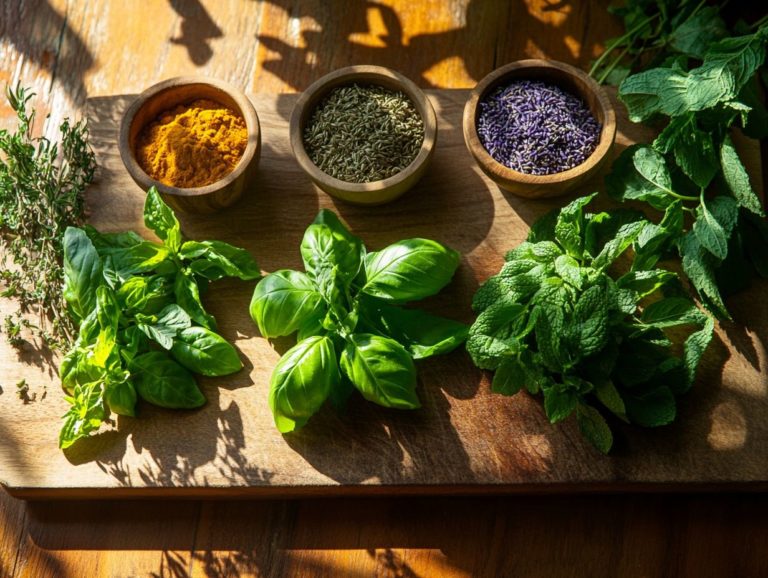Turmeric: The Anti-Inflammatory Powerhouse
Turmeric, often referred to as the “golden spice,” is much more than a vibrant touch to your curry. This ancient spice has gained attention for its remarkable health benefits, especially its strong anti-inflammatory properties.
You will learn what turmeric is, delve into the science behind its effectiveness in fighting inflammation, and explore the various conditions it may help alleviate.
You’ll also find practical tips for effortlessly incorporating turmeric into your daily meals, along with essential precautions to keep in mind.
Discover how this unassuming spice can elevate your health and wellness journey to new heights.
Contents
- Key Takeaways:
- Discover Turmeric: The Golden Spice
- The Science Behind Turmeric’s Anti-Inflammatory Properties
- Benefits of Turmeric for Inflammation
- Conditions that May Benefit from Turmeric
- Other Potential Health Benefits
- How to Incorporate Turmeric into Your Diet
- Possible Side Effects and Precautions
- Frequently Asked Questions
- What is turmeric and what makes it a strong anti-inflammatory?
- How does turmeric help with inflammation in the body?
- Can turmeric be used to treat chronic inflammation?
- How can turmeric be added to a daily diet?
- Are there any potential side effects of consuming turmeric?
- Is turmeric safe to use during pregnancy?
Key Takeaways:
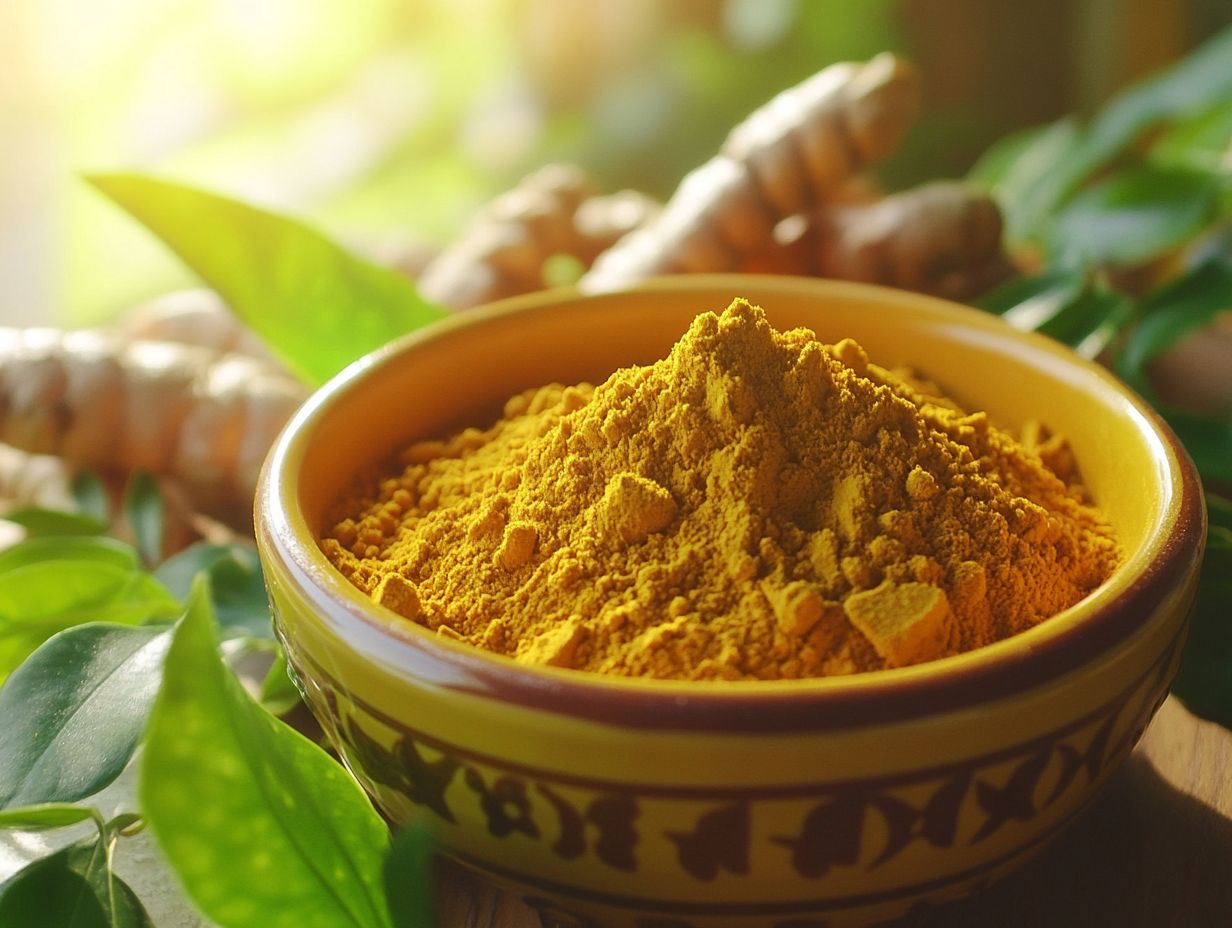
Turmeric is a powerful spice known for its anti-inflammatory properties, making it a beneficial addition to any diet. The key compound in turmeric, curcumin, helps to reduce inflammation in the body. Incorporating turmeric into your meals can benefit inflammation-related conditions and provide other potential health benefits.
Discover Turmeric: The Golden Spice
Turmeric, scientifically called Curcuma longa, is a striking yellow spice from India. It is celebrated not only for its historical importance in Ayurvedic medicine but also for its remarkable superfood qualities.
Often referred to as turmeric root, this spice offers an impressive range of health benefits, including strong antioxidant properties and the ability to combat chronic inflammation.
With a rich history spanning thousands of years, turmeric has established itself as a cornerstone in both culinary and medicinal realms, admired not just in Indian cuisine but embraced worldwide for its versatility and distinctive flavor.
Overview of the Spice and its Uses
Turmeric is not just a beloved spice in your kitchen; it s also celebrated for its health benefits and versatility, available in forms like supplements and tea.
This vibrant yellow root is a culinary staple, especially in Indian and Southeast Asian cuisines, where it adds a warm, earthy flavor to curries, soups, and rice dishes.
But its prowess goes beyond the kitchen. The spice is gaining attention for its active compound, curcumin, which is known for its anti-inflammatory effects.
Health enthusiasts will enjoy adding turmeric to smoothies or wellness bowls, while others prefer it steeped as a calming tea.
If you’re looking to improve your health regimen, turmeric supplements offer a concentrated dose, allowing you to benefit without major dietary changes.
The Science Behind Turmeric’s Anti-Inflammatory Properties
The exceptional anti-inflammatory properties of turmeric come from its active compound, curcumin. This powerful ingredient helps inhibit the NF-kB signaling pathway, a key regulator of inflammation and various chronic diseases.
Incorporating turmeric into your routine can harness the potential of curcumin to support your overall health and well-being.
Key Compounds and their Effects on Inflammation
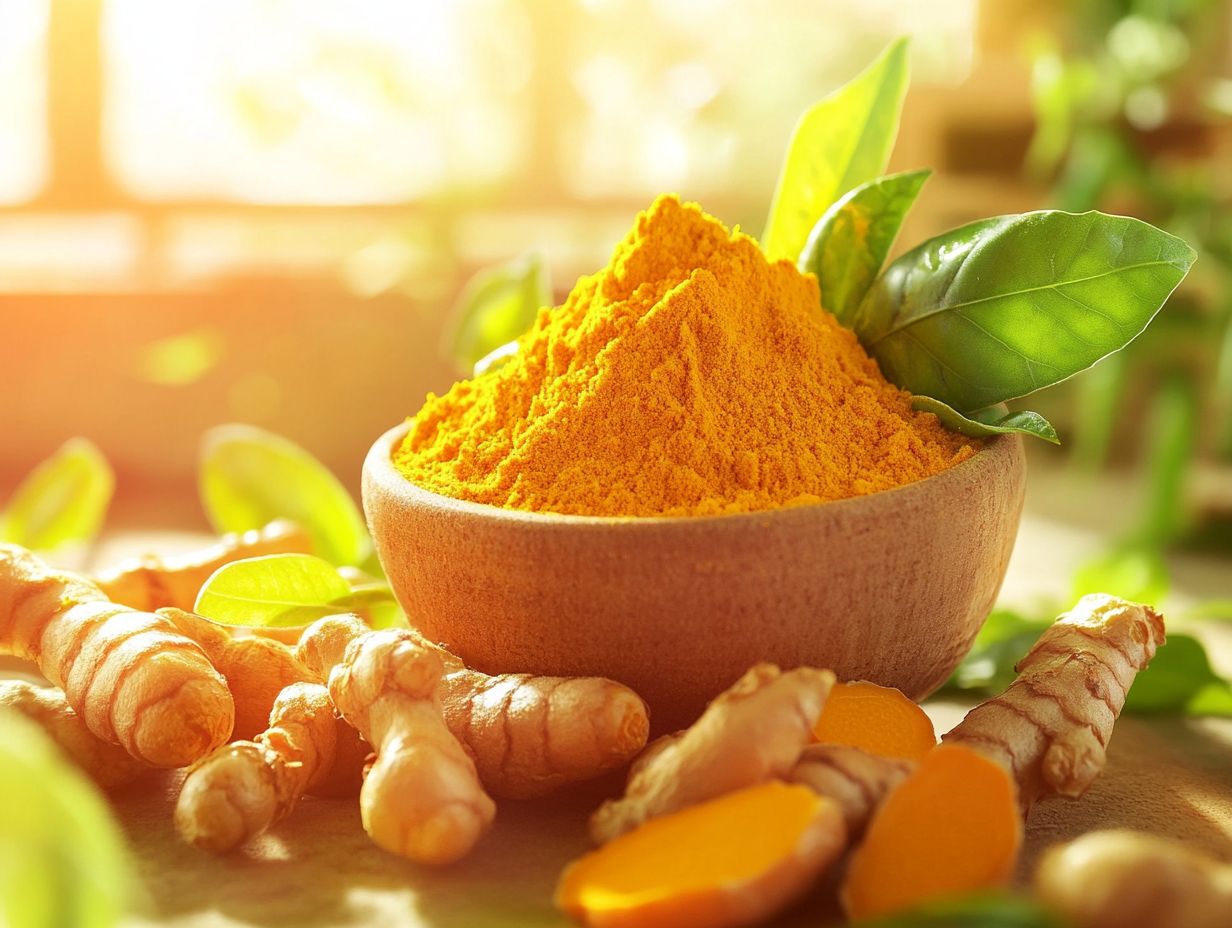
Curcumin is the standout compound in turmeric, known for its strong anti-inflammatory properties. Research shows that its absorption improves when paired with piperine, a compound found in black pepper.
This combination not only boosts curcumin’s effectiveness but also enhances its health benefits. It’s no surprise that health enthusiasts and researchers seek turmeric supplements that include piperine.
Without piperine, curcumin’s absorption can fall short, limiting its anti-inflammatory effects. This highlights the importance of understanding how different compounds work together in your diet and emphasizes the implications for anyone seeking natural remedies for inflammation and related issues.
This knowledge lays the groundwork for developing more effective health strategies.
Benefits of Turmeric for Inflammation
The advantages of turmeric for inflammation are truly remarkable. Research indicates that its anti-inflammatory properties can help manage chronic inflammation, alleviate joint pain, and reduce the risks of serious conditions like cancer and heart disease.
Start adding turmeric to your routine today and transform your health for the better!
Conditions that May Benefit from Turmeric
Turmeric is an incredible support for managing your health! It can help with various conditions, particularly joint pain linked to osteoarthritis and neurological disorders such as Alzheimer s, along with mood issues related to chronic inflammation.
Recent clinical studies highlight that curcumin (the active compound in turmeric) boasts potent anti-inflammatory and antioxidant properties. These qualities may significantly alleviate pain and enhance mobility for those suffering from osteoarthritis. Testimonials from patients dealing with chronic pain suggest that adding turmeric to their daily routines has led to remarkable improvements in their quality of life.
Emerging research also points to turmeric’s potential to boost cognitive function, making it a valuable supplement for those concerned about age-related memory decline. Studies show a link between chronic inflammation and mood disorders, emphasizing turmeric’s role in fighting inflammation and fostering an overall sense of well-being.
Other Potential Health Benefits
Beyond its widely recognized anti-inflammatory benefits, turmeric offers a remarkable array of health advantages:
- Support for kidney health
- Enhancement of memory
- A wealth of antioxidants
Research shows that curcumin helps safeguard kidney function by alleviating oxidative stress and inflammation two major culprits behind kidney deterioration.
A study published in the Journal of Nephrology found that curcumin supplementation notably reduced serum creatinine levels in patients dealing with chronic kidney disease.
In terms of cognitive function, evidence from the American Journal of Geriatric Psychiatry indicates that curcumin may bolster memory performance in older adults thanks to its neuroprotective effects.
Its powerful antioxidant properties work to neutralize free radicals, potentially lowering the risk of various diseases. Such compelling findings highlight the multifaceted benefits of incorporating turmeric into a balanced diet.
How to Incorporate Turmeric into Your Diet
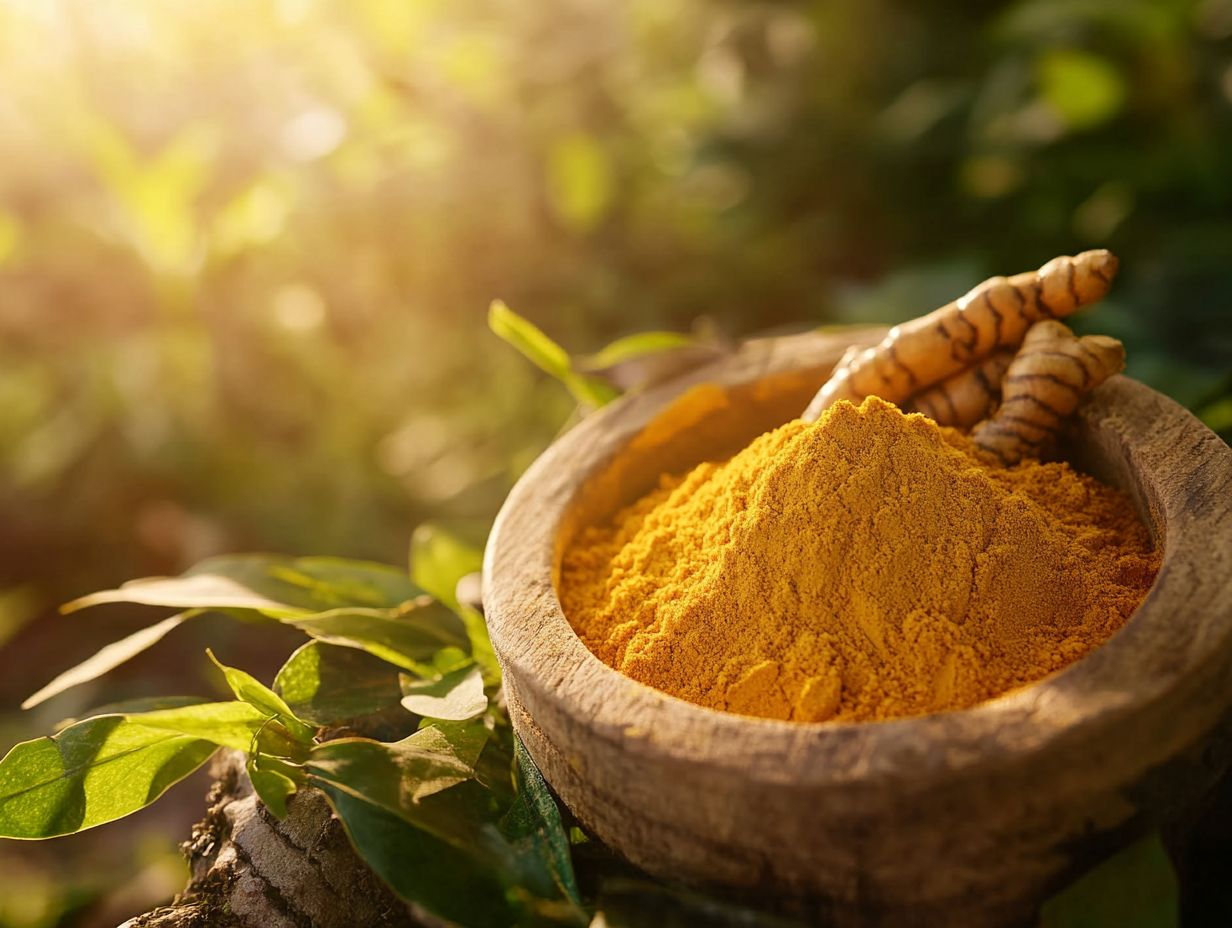
Integrating turmeric into your diet can be both effortless and delightful. Whether you choose to add it to your cooking, brew a soothing cup of turmeric tea, or opt for supplements, you can easily achieve the recommended daily intake to unlock its full spectrum of health benefits.
Tips and Recipes for Adding Turmeric to Meals
To elevate your meals with turmeric, consider exploring a variety of turmeric recipes, from aromatic curry dishes to calming turmeric tea. Adding this vibrant spice is an easy way to boost your meals and your health!
By weaving this lively ingredient into your daily cooking, you can unlock a treasure trove of culinary possibilities that excite the palate while delivering a host of health benefits.
Turmeric shines in marinades, soups, and stir-fries. When combined with black pepper, it greatly enhances the absorption of curcumin, its key active component.
Whether you blend it into smoothies or sprinkle it over roasted vegetables, incorporating turmeric can transform a simple meal into a nourishing feast. These delightful recipes not only celebrate the spice s unique flavor but also harness its anti-inflammatory properties, adding a touch of wellness to every delicious bite.
Possible Side Effects and Precautions
While turmeric is largely considered safe for most individuals, it s essential to remain mindful of potential side effects and interactions. Pay particular attention to the effects of curcumin, dosage recommendations, and how your unique health conditions may influence its impact on your body.
Start adding turmeric to your meals today and feel the difference!
Potential Interactions and Risks
Turmeric may interact with certain medications, especially anti-inflammatory drugs. It’s vital to know its safety profile and recommended dosages for health conditions.
If you take anticoagulants, turmeric can increase bleeding risk. For those on diabetes medication, monitor blood sugar levels closely, as turmeric can amplify the effects.
Consult a healthcare provider before starting turmeric or curcumin supplements. They will guide you on dosages and monitor for any interactions.
Stay informed and cautious to enjoy the benefits of turmeric safely. Your health matters!
Frequently Asked Questions
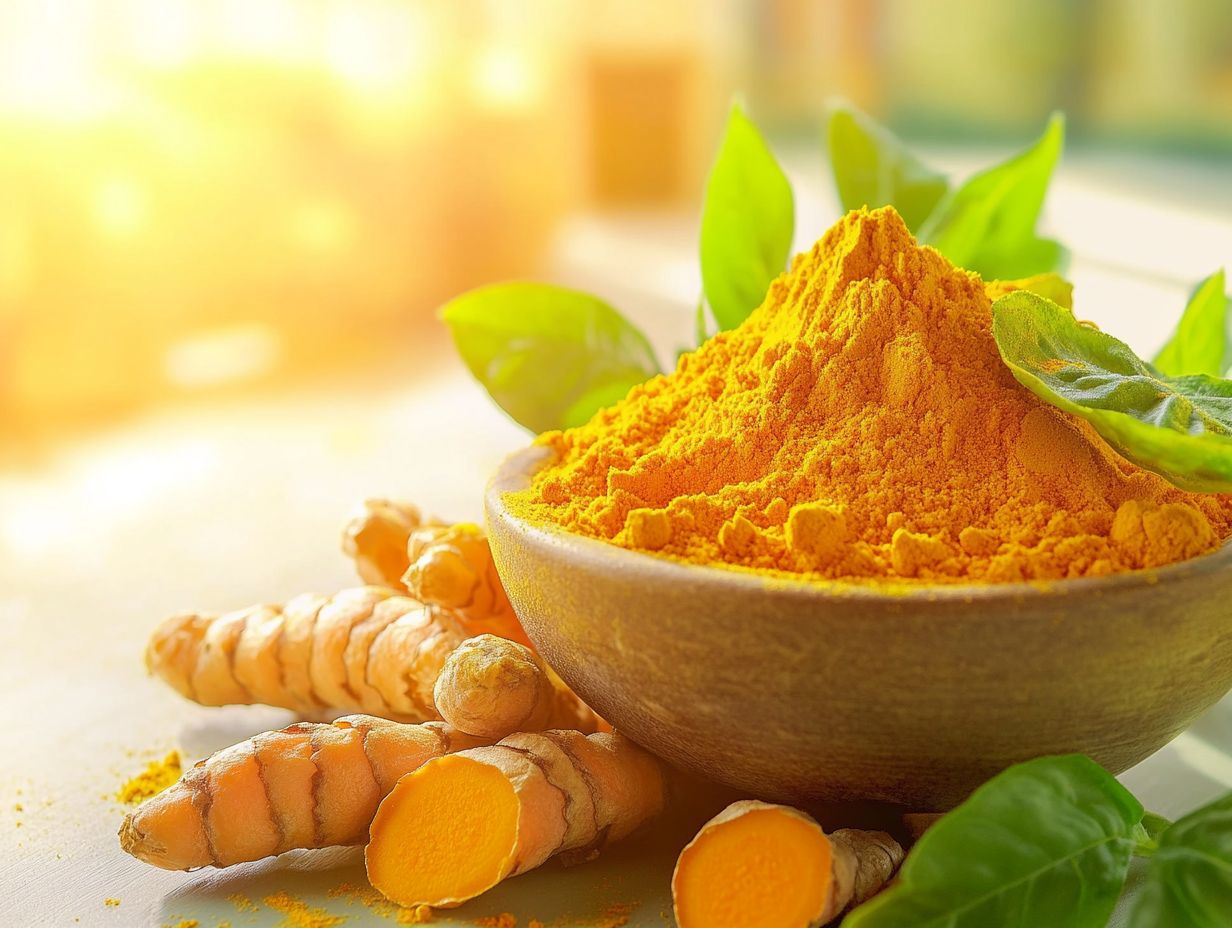
What is turmeric and what makes it a strong anti-inflammatory?
Turmeric is a bright yellow spice from the turmeric plant. It contains curcumin, which has powerful anti-inflammatory effects.
How does turmeric help with inflammation in the body?
Curcumin in turmeric blocks inflammation pathways. It also has antioxidants that reduce oxidative stress and inflammation.
Can turmeric be used to treat chronic inflammation?
Turmeric can help reduce inflammation, but it should not be the only treatment for chronic issues. Always consult a healthcare professional for proper diagnosis and treatment.
How can turmeric be added to a daily diet?
Add turmeric to curries, soups, and stir-fries. You can also make golden milk, add it to smoothies, or take it as a capsule supplement.
Are there any potential side effects of consuming turmeric?
Turmeric is generally safe, but high doses can cause nausea and diarrhea. It may also interact with medications, so check with a healthcare professional before taking supplements.
Is turmeric safe to use during pregnancy?
Turmeric has been used in traditional medicine during pregnancy, but research on its safety is limited. Consult a healthcare professional before adding turmeric to your diet during this time.


